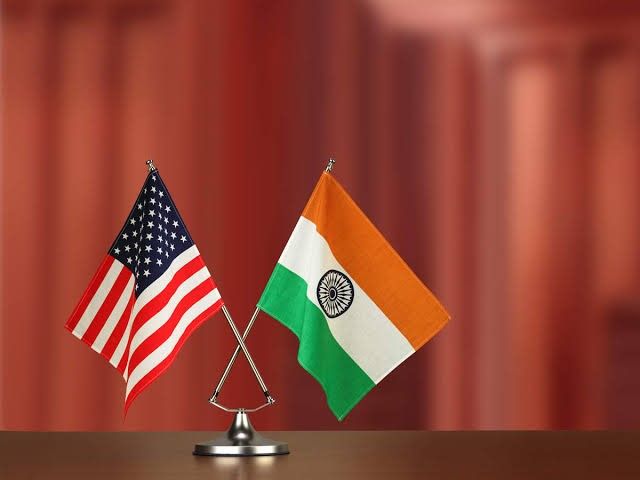Trump’s Re-Election And India’s Strategy
Syllabus:
GS 2:
- India and neighbourhood relations
- Effect of policies and politics of developing and developed countries on India.
Why in the News?
The recent re-election of Donald Trump has sparked discussions on its implications for Indo-US relations, US-China strategies, and the evolving dynamics of the Quad. Key focus areas include his approach to global diplomacy, the Russia-Ukraine conflict, and immigration policies.
Trump’s Re-Election: Key Factors
- Trump’s popularity: Despite controversies like impeachments and fraud accusations, Trump retained a strong electoral base and gained additional support by emphasizing issues like inflation, unemployment, and immigration.
- Historic opposition: Kamala Harris’s candidacy, marked by her identity as an African-American, South Asian, and Indian-American woman, drew attention but couldn’t counterbalance Trump’s campaign strategies.
- Economic focus: The Biden administration’s policies on investment and job creation were perceived as long-term, with immediate inflationary pressures favoring Trump.
- Electoral dynamics: Trump won both the Electoral College and the popular vote, reflecting a shift in voter priorities towards domestic issues over progressive narratives.
Policy Shifts in Trump’s Second Term
- Experienced leadership: Unlike his first term, Trump has quickly finalized his Cabinet appointments, signaling a more organized governance approach.
- Policy autonomy: Trump’s administration will likely align more closely with his personal ideologies, sidelining dissent within the Republican mainstream.
- Streamlined vetting: Unconventional practices, like relying on private agencies for vetting, highlight Trump’s distrust of federal institutions and appeal to his anti-establishment base.
- Strategic appointments: Figures like Tulsi Gabbard and Marco Rubio, known for their hawkish stance on China, indicate a continued focus on global competition.
Elon Musk’s Influence
- Campaign backing: Musk’s financial contributions, through channels like X (formerly Twitter), significantly boosted Trump’s campaign visibility.
- Corporate benefits: Musk’s investment is tied to potential benefits like subsidies, deregulation, and federal support for his companies under Trump’s administration.
- China relations: Musk’s deep investments in China create a complex dynamic, balancing corporate interests against Trump’s anti-China rhetoric.
- Advisory role: As co-chair of the Department of Government Efficiency, Musk’s influence will shape recommendations, though their implementation remains uncertain.
Trump’s Global Policy Priorities
- Russia-Ukraine conflict: Trump seeks to curtail US support for Ukraine, potentially easing Russia’s isolation but risking a US-Europe divide.
- China relations: The focus will remain on addressing trade imbalances, countering technological advances, and leveraging India as a counterweight to China.
- Middle East dynamics: Increased support for Israel amid tensions post-Hamas attacks, while balancing Arab anger over the Israel-Gaza situation.
- Immigration reform: Renewed emphasis on border control and stricter immigration policies, impacting families and workers globally.
India-US Relations in Trump 2.0
- Deepening ties: India remains the largest recipient of US investment, with Global Capability Centers and R&D hubs reinforcing this partnership.
- Strategic alignment: Shared interests in countering China’s dominance, especially in critical technologies, strengthen the India-US partnership.
- Human capital: India’s contribution to semiconductor design and the IT sector positions it as a crucial partner in US technological leadership.
- Geopolitical strategy: A strong India is viewed as a natural check on China’s assertive regional policies, aligning with US strategic interests.
Challenges in Trump’s Policies
- Global skepticism: Trump’s America First approach risks alienating European allies, potentially weakening the transatlantic alliance.
- Domestic divisions: Policies on immigration and trade could face resistance, straining domestic consensus and global partnerships.
- Policy inconsistencies: Balancing hawkish advisers and pro-China interests like Musk may lead to unpredictable decision-making.
- Economic risks: A focus on tariffs and trade restrictions might disrupt global supply chains, affecting India’s economic stability.
- Middle East tensions: Increased support for Israel could exacerbate tensions in the Gulf region, impacting India’s energy security and expatriate workforce.
Way Forward for India
- Strengthen Quad: Collaborate with the US, Japan, and Australia to counterbalance China in the Indo-Pacific region.
- Leverage investments: Enhance partnerships in R&D and technology sectors, capitalizing on India’s role in global supply chains.
- Diversify alliances: Maintain balanced relations with both the US and Russia, avoiding overdependence on either.
- Energy security: Safeguard interests in the Middle East by advocating for diplomatic solutions to regional conflicts.
- Domestic resilience: Focus on skill development and infrastructure to align with US-India strategic objectives and reduce vulnerabilities.
Conclusion
Donald Trump’s second term heralds significant shifts in US foreign and domestic policies, with implications for India-US relations. By capitalizing on opportunities in trade, technology, and strategic partnerships, India can solidify its role as a global player while navigating potential challenges.
Source: Indian Express
Mains Practice Question
Examine the implications of Donald Trump’s re-election on India-US relations. Discuss its impact on China containment strategies, the Quad, and India’s role in global geopolitics.
Associated Article:
https://universalinstitutions.com/strengthening-india-us-relations/






